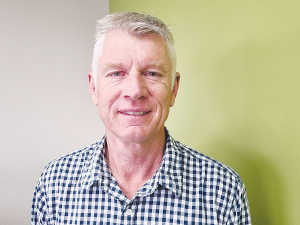Perrin Ag welcomes new consultant Alyssa Brazendale
Agri advisor Perrin Ag says its graduate recruitment programme continues to bring new talent into the agricultural sector.
 Perrin Ag senior consultant Rob Brazendale believes farmers should start planning now for a dry summer.
Perrin Ag senior consultant Rob Brazendale believes farmers should start planning now for a dry summer.
With NIWA predicting a hot, dry summer, farmers are being encouraged to consider once-a-day (OAD) milking as a low-cost strategy to minimise the impact of dry conditions on next season, while looking after their cows and their team.
NIWA has recently released its predictions for the upcoming summer month, with the North Island in for above average temperatures, near or below average rainfall, and near or below average soil moisture.
Perrin Ag senior consultant Rob Brazendale says, while predictions are just that, and they don't know exactly how the season will play out, it is prudent for farmers to start planning now for a dry summer.
"One strategy that is under-utilised, particularly on unirrigated North Island dairy farms, is once-a-day milking.
"Reducing milking frequency to once-a-day from Christmas onwards has been found to have considerable benefits including better cow condition, less heat stress, a small reduction in feed demand, and a much more enjoyable summer for the on-farm team."
A DairyNZ trial where cows were milked OAD from Christmas onwards found these cows had a quarter Body Condition Score (BCS) higher than cows milked twice a day, which flowed through to improved reproduction and milk production the following spring.
Milk production dropped 13% per day at the time of switching to OAD. However, because two thirds of the season's production had been achieved by the time of the switch, this equated to a 5% reduction for the full season.
Brazendale says one argument against using OAD is the impact on somatic cell count (SCC).
"Farmers with herds that have higher SCC would need to manage the transition carefully as SCC could double for a few days after the switch."
He says others can learn from those who have successfully implemented a OAD strategy.
"It is best to make the transition earlier rather than later. If the switch is made while the cows are still milking well, say at 1.5-1.7 kgMS/cow, the impact of increasing SCC is mitigated by higher milk volumes. And again, if cows are milking well and feeding levels are maintained, the decline in milk production tends to be reduced. Avoid the temptation to reduce feed allowances because the cows are being milked OAD."
He says planning now for options to reduce feed demand going into the summer should be a priority for dairy farmers.
"We should expect a period where feed supply will not meet demand.
"Options for dairy farmers to balance this equation fit broadly into two strategies: increase feed supply and/or reduce demand.
"Increasing feed supply normally means increasing the use of purchased feed. While this strategy has served dairy farmers quite well in recent years, the terms of trade for purchased feed appear less favourable this season.
"Feed costs are high at around 40-50c/kgDM down the throat and a $9/kgMS plus milk price is looking less certain.
"Our advice to farmers is to do the maths, use realistic figures for milk responses to feed, allow for wastage and don't forget about the hidden costs of feeding out, including time and depreciation on machinery.
"As the saying goes: plan for the worst and hope for the best."
Voting has started for the renewal of DairyNZ's milksolids levy.
The most successful catchment groups in NZ are those that have 'a source to sea' approach.
Associate Agriculture Minister and Manawatu dairy farmer Andrew Hoggard says the free trade agreement (FTA) negotiated with India is not a bad deal and his party, Act, will support it when it goes before Parliament.
Newly released data from Environment Canterbury (ECan) Farm Environment Plan (FEP) audits are showing a dramatic lift in environmental performance across the region.
A solid recovery of global dairy prices this year makes a $9.50/kgMS milk price almost a shoo-in for this season.
As New Zealand marks the United Nations’ International Year of the Woman Farmer 2026 (IYWF 2026), industry leaders are challenging the misconception that women only support farming.
OPINION: Fonterra may be on the verge of selling its consumer business in New Zealand, but the co-operative is not…
OPINION: What does the birth rate in China have to do with stock trading? Just ask a2 Milk Company.